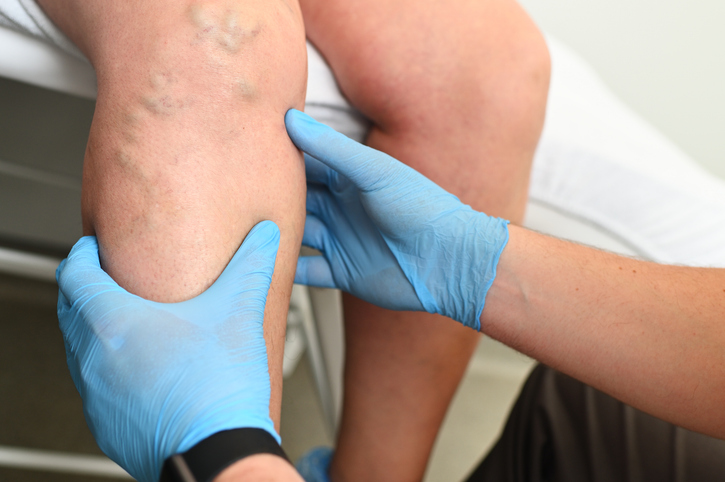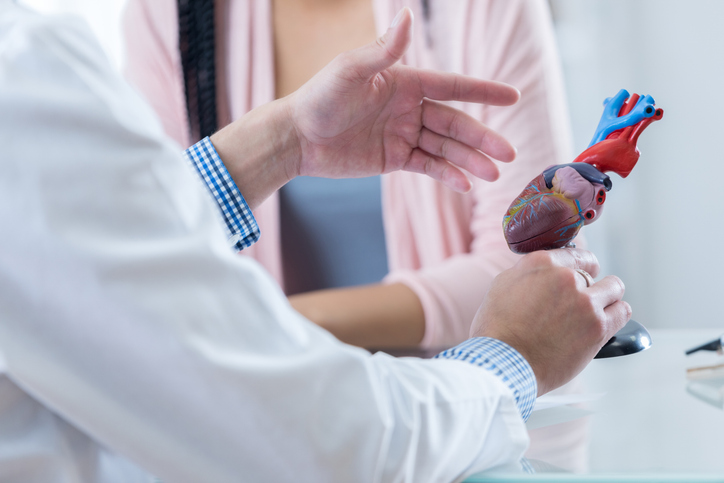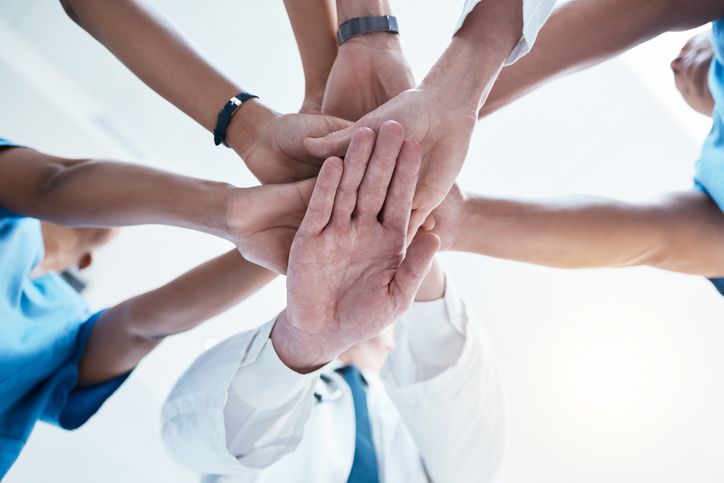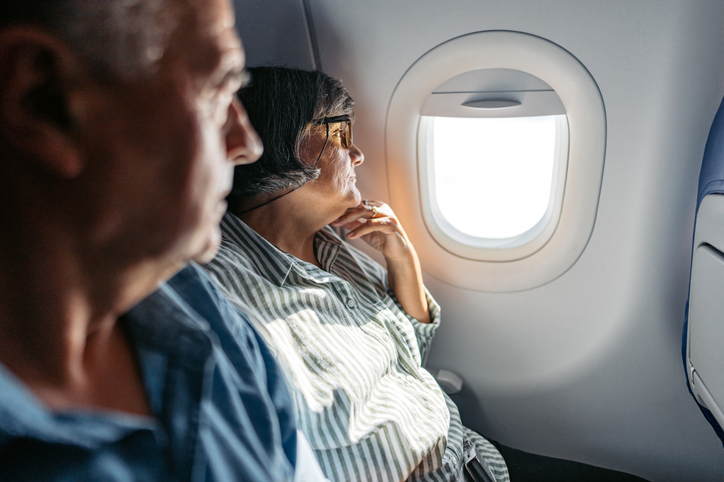Vein Conditions
Vein Conditions
Vein Conditions
Your veins carry blood back to your heart. If veins weaken, sometimes things can go wrong. Doctors call health issues that involve your veins vascular disorders.
Carilion Clinic has a team of vascular specialists who can help with these conditions. We treat everything from varicose veins to life-threatening blood clots. We have more minimally invasive ways to treat vein conditions than ever before.
Your veins carry blood back to your heart. If veins weaken, sometimes things can go wrong. Doctors call health issues that involve your veins vascular disorders.
Carilion Clinic has a team of vascular specialists who can help with these conditions. We treat everything from varicose veins to life-threatening blood clots. We have more minimally invasive ways to treat vein conditions than ever before.
Your veins are part of the complicated highway of blood vessels that move blood throughout your body. Generally, veins have the vital job of returning oxygen-depleted blood to your heart. The heart pumps blood into the lungs, picking up oxygen again.
Vein conditions, or venous disease, happen when your veins have trouble returning blood to the heart.
Looking at the back of your hand, you can see and feel your veins. They're thin, flexible tubes through which blood flows. When all works as it should, your veins have flaps that open and close to allow this blood to flow and to keep it moving toward the heart.
With venous disease, sometimes the valves don't close properly. Blood can leak or flow in ways it shouldn't. This is what causes varicose veins, for example. However, issues with your veins can cause many other problems, including blood clots.
What Is Venous Disease?
Your veins are part of the complicated highway of blood vessels that move blood throughout your body. Generally, veins have the vital job of returning oxygen-depleted blood to your heart. The heart pumps blood into the lungs, picking up oxygen again.
Vein conditions, or venous disease, happen when your veins have trouble returning blood to the heart.
Looking at the back of your hand, you can see and feel your veins. They're thin, flexible tubes through which blood flows. When all works as it should, your veins have flaps that open and close to allow this blood to flow and to keep it moving toward the heart.
With venous disease, sometimes the valves don't close properly. Blood can leak or flow in ways it shouldn't. This is what causes varicose veins, for example. However, issues with your veins can cause many other problems, including blood clots.
Vein-related health issues usually affect your legs. This is because the veins in your legs work against gravity to bring blood to your heart. Standing can also put pressure on your leg veins.
The main types of vein conditions are:
- Blood clots: You can develop a blood clot in any vein if the blood isn't moving well. If the clot develops in the superficial veins at the surface of your skin, it may not be very serious.
- Deep vein thrombosis (DVT): It can be dangerous if blood clots develop in deeper veins, like the leg or an organ. The blood clot can break free and travel to your lungs, causing a pulmonary embolism. This is a life-threatening condition that needs treatment right away.
- Chronic venous insufficiency: This is a condition where your veins don't drain as they should. It causes blood to pool in your legs.
- Varicose veins: These are bulging, spider-like veins in your legs, just under your skin. Varicose veins happen because of weak or damaged valves in your veins.
- Leg ulcers: These are open sores that have trouble healing. They happen because of poor blood flow in the legs.
What causes vein problems?
Factors that doctors know contribute to venous disease include:
- Being a woman
- Pregnancy
- Standing for long periods, for example, jobs that keep you on your feet
- Family history of vein conditions, especially varicose veins
- Smoking
Types of Vein Conditions
Vein-related health issues usually affect your legs. This is because the veins in your legs work against gravity to bring blood to your heart. Standing can also put pressure on your leg veins.
The main types of vein conditions are:
- Blood clots: You can develop a blood clot in any vein if the blood isn't moving well. If the clot develops in the superficial veins at the surface of your skin, it may not be very serious.
- Deep vein thrombosis (DVT): It can be dangerous if blood clots develop in deeper veins, like the leg or an organ. The blood clot can break free and travel to your lungs, causing a pulmonary embolism. This is a life-threatening condition that needs treatment right away.
- Chronic venous insufficiency: This is a condition where your veins don't drain as they should. It causes blood to pool in your legs.
- Varicose veins: These are bulging, spider-like veins in your legs, just under your skin. Varicose veins happen because of weak or damaged valves in your veins.
- Leg ulcers: These are open sores that have trouble healing. They happen because of poor blood flow in the legs.
What causes vein problems?
Factors that doctors know contribute to venous disease include:
- Being a woman
- Pregnancy
- Standing for long periods, for example, jobs that keep you on your feet
- Family history of vein conditions, especially varicose veins
- Smoking
Not all venous diseases have symptoms. It's helpful to know what signs to watch out for and when to seek care.
Blood clot and deep vein thrombosis symptoms
A blood clot can feel like pain and tenderness in a specific area.
It can cause:
- Feeling of a cramp or an ache
- Swelling in one leg (for DVT)
- Redness and skin sensitive to the touch
Pulmonary embolism symptoms
If a blood clot breaks free and travels to the lungs, it can cause a pulmonary embolism. This is a medical emergency.
Call 911 if you have:
- Swelling in your legs, with trouble breathing
- Sharp chest pain that worsens with breathing
- Feeling faint or lightheaded
- Coughing, sometimes with blood
- Rapid heartbeat
- Clammy skin
Varicose veins symptoms
Varicose veins are swollen, twisted veins that can turn dark shades of blue and purple. Not everyone with varicose veins has symptoms.
But some people may have:
- Aching, heaviness and discomfort in legs when standing too long
- Itchy skin or rashes around the veins
- Skin ulcers
Your symptoms may worsen throughout the day but get better when you elevate your legs.
Vein Disease Symptoms
Not all venous diseases have symptoms. It's helpful to know what signs to watch out for and when to seek care.
Blood clot and deep vein thrombosis symptoms
A blood clot can feel like pain and tenderness in a specific area.
It can cause:
- Feeling of a cramp or an ache
- Swelling in one leg (for DVT)
- Redness and skin sensitive to the touch
Pulmonary embolism symptoms
If a blood clot breaks free and travels to the lungs, it can cause a pulmonary embolism. This is a medical emergency.
Call 911 if you have:
- Swelling in your legs, with trouble breathing
- Sharp chest pain that worsens with breathing
- Feeling faint or lightheaded
- Coughing, sometimes with blood
- Rapid heartbeat
- Clammy skin
Varicose veins symptoms
Varicose veins are swollen, twisted veins that can turn dark shades of blue and purple. Not everyone with varicose veins has symptoms.
But some people may have:
- Aching, heaviness and discomfort in legs when standing too long
- Itchy skin or rashes around the veins
- Skin ulcers
Your symptoms may worsen throughout the day but get better when you elevate your legs.
When you see a Carilion vascular specialist, they'll assess your vein condition. They may order imaging and other tests.
Treatments can include:
- Lifestyle changes: Quitting smoking, exercising more and eating healthier can help with some vein conditions.
- Wearing compression stockings: Compression stockings fit tightly and go up to your knee. Compression therapy helps improve the blood flow in your legs.
- Medicine: Your doctor may prescribe blood thinners to prevent blood clots. (They may also use clot-busting drugs in emergencies.)
- Wound care: Your doctor may refer you to a wound healing specialist for leg ulcers that won't heal. Wound specialists use special techniques to encourage healing.
- Thrombectomy: This procedure removes a blood clot from a vein. It can help prevent pulmonary embolism. Our vascular surgeons have minimally invasive ways to perform thrombectomies.
- Vein ablation: This is a way to destroy varicose veins with lasers and heat.
- Vein surgery: Some people may need surgery to treat their varicose veins, venous insufficiency or DVT. Vascular surgeons do these surgeries. Learn more about vascular surgery at Carilion.
How We Treat Varicose Veins and Other Venous Diseases
When you see a Carilion vascular specialist, they'll assess your vein condition. They may order imaging and other tests.
Treatments can include:
- Lifestyle changes: Quitting smoking, exercising more and eating healthier can help with some vein conditions.
- Wearing compression stockings: Compression stockings fit tightly and go up to your knee. Compression therapy helps improve the blood flow in your legs.
- Medicine: Your doctor may prescribe blood thinners to prevent blood clots. (They may also use clot-busting drugs in emergencies.)
- Wound care: Your doctor may refer you to a wound healing specialist for leg ulcers that won't heal. Wound specialists use special techniques to encourage healing.
- Thrombectomy: This procedure removes a blood clot from a vein. It can help prevent pulmonary embolism. Our vascular surgeons have minimally invasive ways to perform thrombectomies.
- Vein ablation: This is a way to destroy varicose veins with lasers and heat.
- Vein surgery: Some people may need surgery to treat their varicose veins, venous insufficiency or DVT. Vascular surgeons do these surgeries. Learn more about vascular surgery at Carilion.
We offer routine heart and vascular care in your neighborhood and are also a destination for many specialty surgeries. Carilion offers programs and treatments that are unique in our region, drawing people from across Virginia and neighboring states.

Largest vascular surgery program in the area
With more vascular surgeons than anyone else in the region, we offer the full range of vascular and vein care. This care includes highly specialized care for life-threatening conditions like deep vein thrombosis and pulmonary embolism.

Range of treatments for varicose veins
Varicose veins are often both a cosmetic issue and a health issue. We use the latest technology to destroy varicose veins. We also offer varicose vein surgery.

More heart and vascular specialists in more places
With heart and vascular clinicians in 30+ locations, we make it easy to connect with the provider you need. We specialize in all heart and vascular care areas and do more than 5,000 minimally invasive procedures every year.

Team approach to care
Our cardiologists, vascular surgeons, nurses, anesthesiologists and support staff work together to help you get the best possible outcome.
Why Choose Carilion Clinic?
We offer routine heart and vascular care in your neighborhood and are also a destination for many specialty surgeries. Carilion offers programs and treatments that are unique in our region, drawing people from across Virginia and neighboring states.
Health and Wellness
Get Care at Carilion Clinic
Your path to better health starts here. Explore comprehensive care options and find the support you need for every step of your wellness journey.
Get Care at Carilion Clinic
Your path to better health starts here. Explore comprehensive care options and find the support you need for every step of your wellness journey.
Get Care at Carilion Clinic
Your path to better health starts here. Explore comprehensive care options and find the support you need for every step of your wellness journey.
Get Care at Carilion Clinic
Your path to better health starts here. Explore comprehensive care options and find the support you need for every step of your wellness journey.
